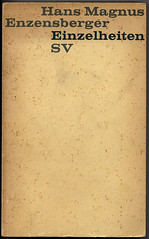While I was in Amsterdam in the winter of 2006-2007 I asked the people in a philosophy bookstore: “If Slavoj Žižek and Sloterdijk are my two favorite contemporary philosophers, who would the third be?” They came up with Hans Magnus Enzensberger and Alain Badiou.
I had remembered Badiou but had almost forgotten Enzensberger, but last weekend at the used book store De Slegte I bought a Dutch translation of Enzensberger’s Einzelheiten, and was very much taken by his analysis of the concept avant-garde in his essay The Aporias of the Avant-Garde.
Aporias, published in 1962 in Germany, is one of the first essays that preached the “death of the avant-garde” which has been celebrated since the advent of postmodernism. It features good analyses too of Lukacs petty defense of literary realism and stimulating reflections on the absurdity of some critics’ grouping of individual artists into art movements, especially in cases such as expressionist literature (no writer has ever called himself expressionist).
On a general level it provides excellent etymological and semantic analyses of the term avant-garde.
P.S. Published in the same year was another work on avant-garde practices, which I suspect is more an eulogy: The Theory of the Avant-garde by Renato Poggioli.

